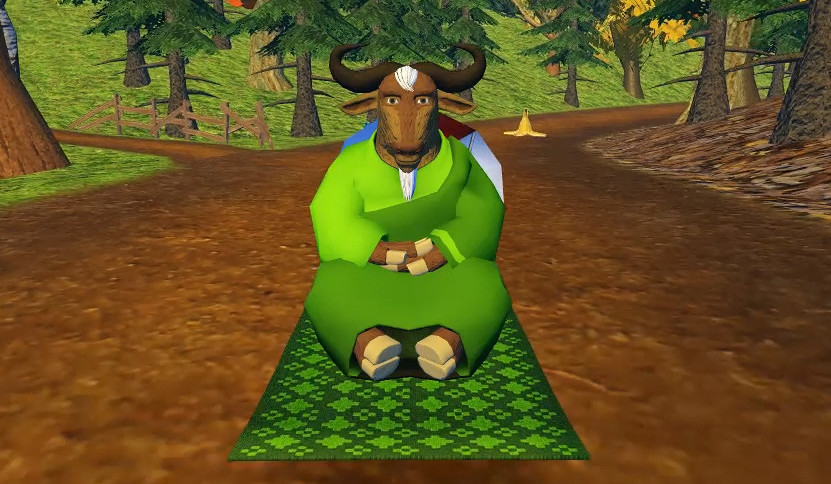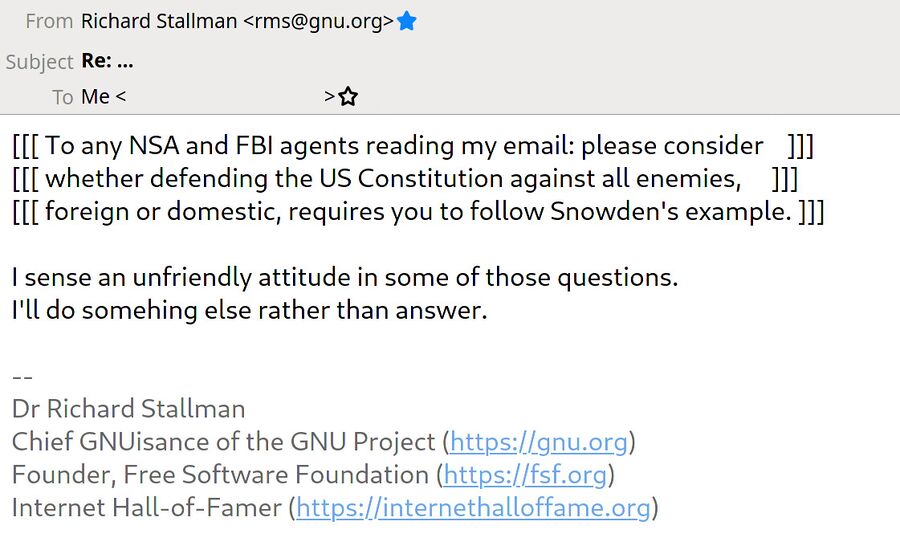The GNU Operating System Turns 37
Honorary Doctor Richard Stallman announced his total plan to create a free Unix-line operating system called GNU 37 years ago today. "I am going to write a complete Unix-compatible software system called GNU (for Gnu's Not Unix), and give it away free(1) to everyone who can use it.". The result of his hard work is the family of operating systems we now call GNU/Linux, or, in most cases, just Linux.
written by 윤채경 (Yoon Chae-kyung) 2020-09-28 - last edited 2020-09-28. © CC BY

GNU as depicted in the free kart racing game SuperTuxKart.
"GNU will be a kernel plus all the utilities needed to write and run C programs: editor, shell, C compiler, linker, assembler, and a few other things. After this we will add a text formatter, a YACC, an Empire game, a spreadsheet, and hundreds of other things."
Honorary Doctor Richard Stallman did manage to write most of the components needed to create a entirely free operating system. Stallman decided to start with big projects like the GNU C Compiler (GCC) and do the system kernel once the big building blocks where in place. One key component was missing in the early 1990s: A functional kernel.
A young man from Finland shared some of the same dreams Richard Stallman did: Linus Torvalds has his own dream of having a Unix-like operating system on his home computer. He wrote the FREAX kernel, which was quickly renamed to Linux, and released version 0.01 under a free license in 1991.
"Sadly, a kernel by itself gets you nowhere. To get a working system you need a shell, compilers, a library etc. These are separate parts and may be under a stricter (or even looser) copyright. Most of the tools used with linux are GNU software and are under the GNU copyleft. These tools aren't in the distribution - ask me (or GNU) for more info."
The combination Linus Torvalds Linux kernel and the vast amount of GNU user-land tools became very popular. It did not become popular enough to bankrupt Microsoft who to this day has a majority desktop market share with their proprietary Windows operating system but it did have a lot of success in it's own right: All the operating systems we think of as "Linux distributions", such as Deepin, Linux Mint, Manjaro Linux, Gentoo Linux and Ubuntu are all combinations of the Linux kernel and the GNU user-land.
Richard Stallman had this to say about GNU's 37th anniversary:

Richard Stallman in an e-mail to linuxreviews.org on September 15th, 2020}}
The GNU Project Announcement In 1983[edit]
The following is the complete announcement of the GNU operating system from 1983:
From CSvax:pur-ee:inuxc!ixn5c!ihnp4!houxm!mhuxi!eagle!mit-vax!mit-eddie!RMS@MIT-OZ
From: RMS%MIT-OZ@mit-eddie
Newsgroups: net.unix-wizards,net.usoft
Subject: new Unix implementation
Date: Tue, 27-Sep-83 12:35:59 EST
Organization: MIT AI Lab, Cambridge, MA
Free Unix!
Starting this Thanksgiving I am going to write a complete
Unix-compatible software system called GNU (for Gnu's Not Unix), and
give it away free(1) to everyone who can use it.
Contributions of time, money, programs and equipment are greatly
needed.
To begin with, GNU will be a kernel plus all the utilities needed to
write and run C programs: editor, shell, C compiler, linker,
assembler, and a few other things. After this we will add a text
formatter, a YACC, an Empire game, a spreadsheet, and hundreds of
other things. We hope to supply, eventually, everything useful that
normally comes with a Unix system, and anything else useful, including
on-line and hardcopy documentation.
GNU will be able to run Unix programs, but will not be identical
to Unix. We will make all improvements that are convenient, based
on our experience with other operating systems. In particular,
we plan to have longer filenames, file version numbers, a crashproof
file system, filename completion perhaps, terminal-independent
display support, and eventually a Lisp-based window system through
which several Lisp programs and ordinary Unix programs can share a screen.
Both C and Lisp will be available as system programming languages.
We will have network software based on MIT's chaosnet protocol,
far superior to UUCP. We may also have something compatible
with UUCP.
Who Am I?
I am Richard Stallman, inventor of the original much-imitated EMACS
editor, now at the Artificial Intelligence Lab at MIT. I have worked
extensively on compilers, editors, debuggers, command interpreters, the
Incompatible Timesharing System and the Lisp Machine operating system.
I pioneered terminal-independent display support in ITS. In addition I
have implemented one crashproof file system and two window systems for
Lisp machines.
Why I Must Write GNU
I consider that the golden rule requires that if I like a program I
must share it with other people who like it. I cannot in good
conscience sign a nondisclosure agreement or a software license
agreement.
So that I can continue to use computers without violating my principles,
I have decided to put together a sufficient body of free software so that
I will be able to get along without any software that is not free.
How You Can Contribute
I am asking computer manufacturers for donations of machines and money.
I'm asking individuals for donations of programs and work.
One computer manufacturer has already offered to provide a machine. But
we could use more. One consequence you can expect if you donate
machines is that GNU will run on them at an early date. The machine had
better be able to operate in a residential area, and not require
sophisticated cooling or power.
Individual programmers can contribute by writing a compatible duplicate
of some Unix utility and giving it to me. For most projects, such
part-time distributed work would be very hard to coordinate; the
independently-written parts would not work together. But for the
particular task of replacing Unix, this problem is absent. Most
interface specifications are fixed by Unix compatibility. If each
contribution works with the rest of Unix, it will probably work
with the rest of GNU.
If I get donations of money, I may be able to hire a few people full or
part time. The salary won't be high, but I'm looking for people for
whom knowing they are helping humanity is as important as money. I view
this as a way of enabling dedicated people to devote their full energies to
working on GNU by sparing them the need to make a living in another way.
For more information, contact me.
Arpanet mail:
RMS@MIT-MC.ARPA
Usenet:
...!mit-eddie!RMS@OZ
...!mit-vax!RMS@OZ
US Snail:
Richard Stallman
166 Prospect St
Cambridge, MA 02139
It's amazing that it's been 37 years already. Happy birthday GNU!


Enable comment auto-refresher
Gnu4ever
Permalink |